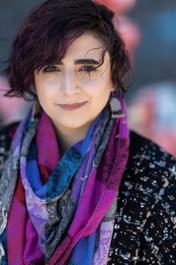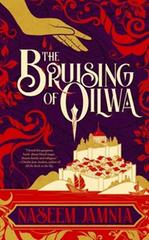
|
|
| photo: Jeramie Lu | |
Naseem Jamnia (they/them) is a Persian-Chicagoan, former scientist and fiction MFA graduate from the University of Nevada, Reno. Their work has appeared in the Washington Post, Bitch Media, Cosmopolitan, the Rumpus, the Writer's Chronicle and elsewhere. Jamnia received fellowships from Lambda Literary and Otherwise and was named the inaugural Samuel R. Delany Fellow. Jamnia is the managing editor at Sword & Kettle Press. Their debut novella, The Bruising of Qilwa (Tachyon), explores questions of identity and belonging in a nuanced medical mystery.
Handsell readers your book in 25 words or less:
Queernormative, Persian-inspired secondary world--starring an aroace, nonbinary, blood magic-wielding refugee healer--about migration, medical racism, medical ethics and colonialism, centered around found family.
On your nightstand now:
At the time of writing this, it is Portrait of a Thief by Grace D. Li, an incredible meditation on colonialism, differences in diasporic experiences, being a child to immigrants, the Ivy Plus atmosphere and the Western gaze. I'm obviously not Chinese, but I do come from an Asian culture with a fraught history of imperialism and colonization. And I'm also a child of immigrants with complex diaspora feelings, who went to Ivy Plus schools--so the contents hit home in many ways.
Favorite book when you were a child:
There are many I could shout out, but I'll go with Tamora Pierce's Song of the Lioness quartet. More than any of her other books (and I've read all of them), Alanna's story has stuck with me all these years. It was the closest representation of my gender I saw for years; I didn't have the language of "nonbinary" until my 20s, but I'd always felt Alanna's struggles with her own gender were somewhat analogous to mine.
Your top five authors:
N.K. Jemisin is a maker and shaker. She is a legend. She writes masterpieces. She has forever changed speculative fiction.
Kazuo Ishiguro has been my favorite author since I first read The Remains of the Day in high school (it's the most perfect book ever written). His language is exquisite, and his stories are quiet and thoughtful--my favorite kinds.
S.A. Chakraborty is not only an all-around great person but also a fabulous writer. I fell in love with the world of Daevabad immediately--seeing my culture portrayed on the page so thoughtfully was amazing! I wish I had a fraction of her knowledge.
Charlie Jane Anders is one of the best humans I know, but Even Greater Mistakes demonstrates to me that she's also one of the best authors I've read. She's a powerhouse who has shaped and will continue to shape queer and speculative literature.
This is 100% cheating because the books aren't out yet, but Terry J. Benton-Walker is one of my closest friends and writes incredible books. His debut YA, Blood Debts, is full of love and compassion and justice. His debut middle grade, Alex Wise vs. the End of the World, will make so many kids feel seen.
Book you've faked reading:
Gosh, I was that kid in English class who consistently read everything that was assigned, but in my MFA I finally cheated and did not actually finish Virginia Woolf's To the Lighthouse. I had to read it in my Intro to Graduate Studies class; I was super overwhelmed with things, so I read some of it and, for the first time, used SparkNotes for the rest. I did not have it in me to blast through it on top of reading Moby-Dick for my fiction workshop. (Sorry, Dan!)
 Book you're an evangelist for:
Book you're an evangelist for:
Have you heard the gospel of The Actual Star by Monica Byrne? I've gifted three or four copies of this book by now. It's a revelation. Three timelines, each set a thousand years after the next, with a tighter narrative than Cloud Atlas and a post-climate-collapse future that is hopeful and expansive societally, economically, socially and culturally. I'm amazed this book has not been on every awards list. It's truly a marvel on every level.
Book you've bought for the cover:
I bought the U.K. editions of the Blood Heir trilogy by Amélie Wen Zhao, because I am in love with those covers. This feels like a fake answer because Amélie is a friend of mine, so I would have bought copies of her books anyway, but I could not resist the Goldsboro sprayed-edge editions.
Book you hid from your parents:
I don't remember how old I was when I got Are You There God? It's Me, Margaret by Judy Blume from the library, but I do remember acutely knowing that I could not, under any circumstances, let my parents know the contents of this book. Unfortunately, my parents did find out and made me return it, so I never finished it. (Very fortunately, they have grown with me as people and parents and, I think, would handle this very differently now.)
Book that changed your life:
Though it had been recommended to me before this, I didn't pick up Jemisin's The Fifth Season until after I'd quit my Ph.D. program and moved to Reno. I was working on a project that I'd been picking at for a few years, but it wasn't coming together. The Fifth Season not only unlocked that project for me (this became my MFA thesis novel, which later inspired The Bruising of Qilwa, which is set in that same universe) but also showed me what speculative fiction--indeed, what all fiction--could be. I've always loved English class, because literary analysis makes books come alive in a whole new way for me; reading The Fifth Season showed me that books across genres can be master classes in literature, worthy of such analyses. I was stunned by Jemisin's point-of-view choices, braided narrative, time jumps, character designs, worldbuilding--every word in that book is utter perfection. It fundamentally changed how I approach writing.
Favorite line from a book:
"Indeed--why should I not admit it?--in that very moment, my heart was breaking." --Kazuo Ishiguro, The Remains of the Day
Five books you'll never part with:
Because I already waxed poetic about The Fifth Season and chose a quote from The Remains of the Day, I'm going to list five other books in the interest of ~diversity~ in my answers.
So You Want to Be a Robot by Merc Fenn Wolfmoor--an exquisite short fiction collection by one of the most revolutionary authors I've ever read.
She Who Became the Sun by Shelley Parker-Chan--holy cannoli on a ravioli, Batman, I hope one day I can write a historical speculative fiction of Iran like this.
The Complete Persepolis by Marjane Satrapi--the book I first saw myself in, at age 21.
Borderlands/La Frontera by Gloria Anzaldúa--a stunning examination of liminal spaces of identity.
Craft in the Real World by Matthew Salesses--a redefinition of craft and validation of the experience of being a marginalized person in writing workshops.
Book you most want to read again for the first time:
It took me a while to realize the answer here: The Traitor Baru Cormorant by Seth Dickinson. It's exquisite on the line level and in its larger scope; how does someone make accounting so tense? I'm in awe of every line: "This is the truth. You will know because it hurts." AND IT HURTS A LOT!

